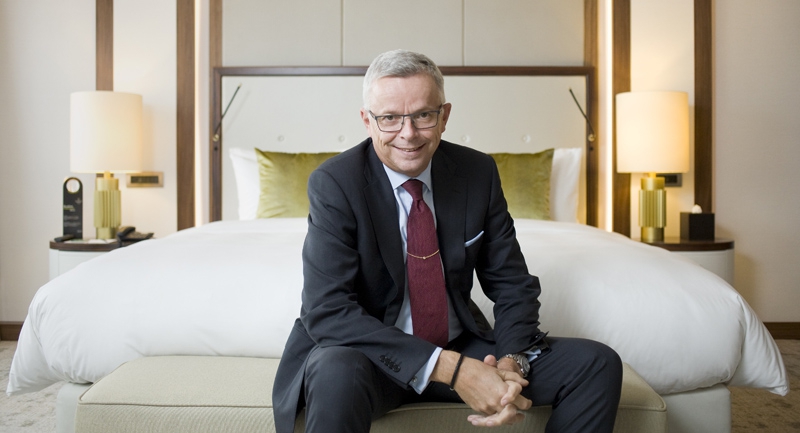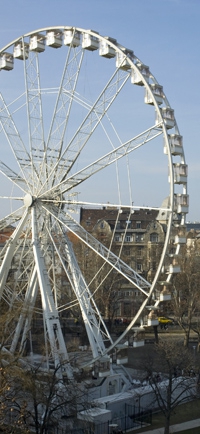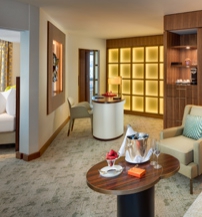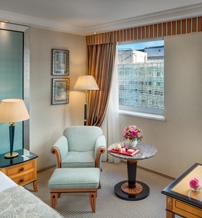
Best of Budapest & Hungary
Measure of Quality
The 'Restorer' - Interview with Stephan Interthal, GM of Budapapest's Kempinski hotel
General Manager of Kempinski Hotel Corvinus Budapest, Stephan Interthal talks about how to succeed in an industry driven by competition and increasingly high customer expectations.
“We have been uncompromising about our core mission, since opening 26 years ago, to provide the highest and most personalized services,” states Interthal, highlighting that hospitality is first and foremost, a ‘people’s business’ and that he believes this is the most important thing that one has to understand when joining his hotel. “We are human beings and everything depends on how we treat other human beings, simple as that. At Kempinski, each and every one of us are personally responsible for creating rich and meaningful experiences for all of our guests. Content guests turn into loyal guests, and to see guests return is the best positive feedback for a hotel. Naturally, the staff has to be well-treated and feel comfortable in their positions, in order to be able to comfort guests. Eventually the result is a hotel that feels good, functions well, clicks and ticks right. I believe that, in our hotel, guests can feel the good vibe, great spirit and energy immediately upon their arrival.”
According to Interthal, it is also crucial to adapt to the changing needs and expectations of guests. “As we speak, the latest room and suite renovations are about to finish on Floors 5-7 – closing the first phase of the hotel’s rooms renovation program that started in November 2017,” he notes, explaining that the renovation lifespan for a hotel is considered to be 10-15 years, in general. “In order to keep the hotel fresh, a comprehensive reimagining and renovation is under way, following the reconstruction of the first floor’s event area, the former ballroom and the associated halls last April - a EUR 2.1 million project, during which the latest technical and interior design solutions were used to create a truly innovative and state-of-the-art event venue named ‘Ten Rooms."
Uncompromising in inspiration and lavish in design
"Within a few days, 30 Premium Grand Deluxe Rooms and 10 Suites will be re-modelled top to bottom, based on the plans of British designer Alex Kravetz who won the hotel’s architecture and design competition. Featuring a soft color palette of elegant gold, reserved platina and muted grey as well as warm dark brown wood, the redesigned spaces represent more than just rooms: they reflect the aesthetics of the contemporary and design-savvy sensibility of the modern traveler, who expects a sensory experience and a place of comfort within the hotel. Refreshed inside-out, these spacious rooms invite guests to stay and enjoy the interior vibe with a comfortable seating area, abundant natural light, and a light-enhanced separation of functions within the room. Shades will be upgraded with blackout blinds, while smart IT and TV sets guarantee better connectivity to guests’ devices,” Interthal notes. “This sensitive restoration will enable us to continue to meet our guests’ high expectations, which have changed dramatically over the past few years. For instance, nobody needs us to present a wide range of movies any longer. Today’s travelers (and I don’t mean the millennial generation only) rather watch the content stored on their own devices, or stream content wirelessly. Also, they are likely to access their emails and social media networks on the TV screen.” The GM reveals that the EUR 8.5 million project was, in fact, a mix of full renovations of the Grand Deluxe Rooms and Suites, where everything was stripped down to its bones, and soft refreshments that involved the re-decoration of 125 Premium Superior and Deluxe Rooms, from carpets to curtains, to create a refined atmosphere featuring comforting pastel colors. “Our aim was to transform these rooms and corridors to bright and light, not modern but contemporary spaces that are elegant, timeless and sustainable for the coming 10 years, offering a contemporary organic design that connects with Budapest’s energy, as well as thoughtful amenities that indulge guests' affection for the finer accoutrements of life.”
The ‘Restorer’
Vehemently talking about smart solutions, including door locks that are not mechanical anymore, it is clear that Interthal is able to immerse himself in renovation projects. In fact, he has conducted several major renovations during his 40-year-long career in the hospitality business. Before his current appointment, he was in charge of Hotel Baltschug Kempinski Moscow for one and a half years, overseeing the final stages of an EUR 20-million renovation project. Kempinski Hotel Corvinus Budapest isn’t new to him either, as he held the GM position here between 1997 and 2004, during which time he orchestrated ambitious renovation works to overhaul all of the rooms and suites, the spa and the restaurant. “Centrally located in a purpose-built, boldly contemporary edifice, this hotel had huge potential back then, but it turned 10-years-old without any facelifts. We felt it was a little off-sided in the market, with many new competition opening, so we chose to upgrade the product. Excellent owners we have, who accepted our argument that the renovation was necessary to stay alive and remain competitive in the future,” Interthal recalls the era before and around the time Hungary joined the EU. He says he has always followed the progress in Hungary, even while away in Moscow, and earlier at the Kempinski Hotel Beijing Lufthansa in China, as “from a silent, secondary post-communist country it developed to a lively, competitive actor on the scene of tourism destinations, ready to compete with Brussels, Munich, Vienna and Prague.” The GM continues, “Budapest has become my second home and I very much enjoy life here. It is wonderful to see the capital blooming, I especially adore the smartly restored, not too commercial, beautiful buildings which preserve the glory of the past centuries. As a teaser, our website says: Some of us were born in Budapest. Some of us adopted Budapest as a temporary home. All of us became Budapesters. One way or another, we all keep making little or not so little discoveries about this ever changing city every day because, like any city, it is in constant motion, just like our own lives. Enhanced by the natural charm of the Danube River and Buda Hills, Budapest’s monarchical, modern and urban vibe adds irresistible energy to meetings and conferences. Complete with a culinary curiosity, buoyant art scene and electrifying diversions, it will host events to remember.”
Happy to experience that tourism is growing, and that there is a shift towards 'quality over quantity' tourism strategies, Interthal intends to stay at the helm of Budapest’s Kempinski hotel to make sure it will continue to reinvent international luxury in its outfitting, as well as in its service.
The DNA of the hotel
Interthal notes that Kempinski Hotel Corvinus has a good mix of experienced staff and newcomers, that is to say young talents. “Someone once said that hotels will never undergo any crisis in terms of not having guests, but there can be a crisis of not having enough staff. It is a huge challenge in the industry to attract young people to come aboard. Our yearly turnover is around 25-30 per cent, which is a healthy fluctuation, which tends to be generated from the youngest employees coming and leaving. We pride ourselves on being a cradle that nurtures young talents, promotes them and welcomes them back when they are ready. At the same time, we have several employees who have stayed with us for some two decades – people who carry the DNA of the hotel, such as our head concierge Tamás Takács, who knows every nook and cranny of this city and being ‘an institution’, he was recently named Best Hotel Concierge by Traveler.com.au (‘The world's best hotels and resorts of 2017’ list). The hotel today has some 300 employees, 349 rooms, five restaurants and bars comprised as 'Gastronomic Quarter Downtown Budapest', and we enjoy a market leading position. I think we are definitely among the top service provider in Budapest, proud of our most recent accolades such as the title of ‘Hungary’s Leading Hotel by World Travel Awards,’ which we won for the fourth time in addition to the award by the Forbes Travel Guide. BOX 1: ART COLLECTION As of 1992, the Kempinski Hotel Corvinus contributes significantly to Budapest’s modern-art scene by buying works, building a unique own branded collection that today comprises of a total of 1000 pieces of statues, reliefs and paintings. Many of these artworks are placed in the hallways and guestrooms, except for a 40-piece collection that has been and will be exhibited in different venues outside of the hotel, including the Hungarian Embassy in Berlin.
About Stephan Interthal
Stephan Interthal is a graduate of Cornell University and the recipient of a European Business MBA from Reims Management School in 2000. A true hotelier with management experience at Kempinski’s finest properties, including Kempinski Vier Jahreszeiten Munich and the legendary Hotel Adlon Kempinski Berlin, Interthal offers a wealth of experience from nearly four decades in the hospitality industry. He says he is a “passionate guy,” who knew, as early as the age of 16, that he would one day become a hotel director. Beautifully accomplished his mission, he says he wakes up every morning with a smile on his face and he loves going to work. “I guess if that smile would fade away I would quit working in this business instantly,” he notes, adding he hopes he will be one day remembered as “a good leader who challenged but also respected his people.”







